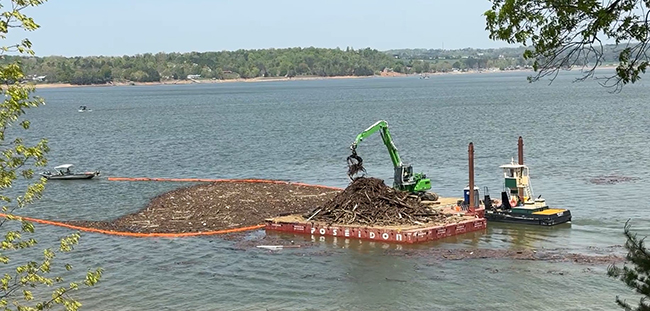Op-Ed: Douglas Lake’s Comeback — A Story of Resilience, Trust and Community
 Douglas Lake has always been more than a reservoir. For many, it’s a livelihood. For others, it’s relaxation and treasured family memories. For all of us, it’s a place of connection, recreation and renewal.
Douglas Lake has always been more than a reservoir. For many, it’s a livelihood. For others, it’s relaxation and treasured family memories. For all of us, it’s a place of connection, recreation and renewal.
When Tropical Storm Helene swept through last fall, it changed everything and altered lives. In just a few days, the lake rose more than 20 feet.
Docks and property were damaged. Businesses were jeopardized. Water that once brought vitality to this region was suddenly overrun by debris — logs, wreckage, even entire structures. It felt overwhelming. It was unsettling. And it left many residents asking: How will this ever get cleaned up?
The answer came in the form of a remarkable partnership — and an even more remarkable community.
The Tennessee Valley Authority was honored to be tasked with leading a massive and coordinated, interagency cleanup effort. Solving complex issues like this is what TVA was designed to do.
The Tennessee Department of Environment and Conservation (TDEC), as the agency that protects human health and the environment while promoting overall quality of life statewide, was proud to take a key ownership stake in this endeavor.
We worked alongside associates from the Federal Emergency Management Agency (FEMA), the Tennessee Emergency Management Agency (TEMA), the Environmental Protection Agency (EPA), the U.S. Army Corps of Engineers (USACE), the Occupational Safety and Health Administration (OSHA) and East Tennessee partners like Jefferson County Emergency Management Agency and Jefferson County Tourism.
The Douglas Lake cleanup effort was a textbook example that proves government agencies can work together effectively and efficiently to fulfill the needs of the people we serve.
Working together, our crews removed more than 177,000 cubic yards of vegetative debris and close to 3,000 tons of manmade materials — enough to fill a football field rising 100 feet tall.
We deployed a 4,000-foot floating boom to protect Douglas Dam, conducted underwater surveys and performed water quality testing to ensure the lake was safe for people, pets and wildlife.
But the real story isn’t just about the logistics, it’s about the people.
From the moment crews arrived, we were met with questions, but also patience and trust. Residents opened their properties — some even delivered freshly baked cookies to cleanup crews. Business owners shared their stories and offered assistance.
Volunteers — 100 strong, including TVA President & CEO Don Moul — showed up for a day of service, collecting more than 80 bags of trash and assembling 200 care packages for families still reeling from Helene.
Over and over, we heard, “Douglas Lake means so much to us.” Throughout nearly nine months of hard work, that sentiment could be felt each morning. It reminded us how much the work mattered to the people we serve.
We knew it would be a long but rewarding process. We asked the community to trust us — to believe that we could accomplish the mission. And they did.
There were many moments reinforcing that helping people was at the heart of our effort. When a property owner’s dog was injured by a piece of metal debris along their shoreline, our crew responded that same day to remove the hazard — and then returned days later with dog treats and well wishes.
That’s the kind of connection that defined this project.
Today, Douglas Lake is open for business and thriving. The water is safe, with water quality testing results essentially mirroring pre-Helene levels. Sport fish populations appear healthy and unaffected.
And as the fall colors soon emerge, the lake is ready for boating, fishing and making more memories.
To the Douglas Lake community: Thank you. Stewardship isn’t just about managing resources — it’s about serving people. Your resilience, generosity and spirit carried this project forward.
To our agency partners: Thank you for stepping up, going all in and never losing sight of the mission.
This was more than a cleanup. It was a comeback. And it was made possible by a community that never gave up on its lake — or each other.









